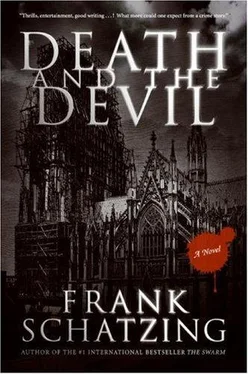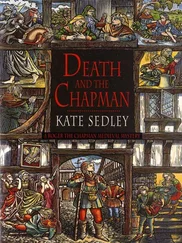“What did you do?” he asked, uncertain.
“Nothing. I just put the joint back in place. It was slightly out. Not completely, the pain would have been too much to bear, but it wasn’t quite the way the good Lord intended. Do you feel better now?”
Jacob nodded. The feeling of wretchedness had vanished. With his arm, his mind was back in working order, too. “Thank you,” he said.
“Don’t mention it,” bellowed Goddert in his genial manner.
“What have you got to do with it?” cried Jaspar in annoyance. “If you’d helped, we’d have been burying him now.”
Richmodis slapped the table again. “Do you think you could stop quarreling for a moment? Jacob has something to tell us.”
Goddert raised his hand. “I do have a question.”
“What?”
“Who is this Jacob, actually?”
“Correct,” Jaspar broke in. “That’s a damned good question. Whom have I been treating?”
“He’s a—” But Richmodis got no further. Jacob had raised his hand and was astonished when all three fell silent.
He told them his story.
It was a quiet year.
The emperor issued an unpopular edict against the autonomy of cathedral cities, especially Cologne. The archbishop of Cologne confirmed the consecration of the Church of the Maccabees. A preaching order took over a building in Stolkgasse and a priest was convicted of murder. Otherwise nothing much happened.
Jacob was born.
He very quickly lost count of the number of his birthdays. There was nothing unusual in that. Very few knew exactly how old they were. His parents were peasants, taciturn folk who farmed a hide of land on the estates of the cathedral chapter in Worringen, a village outside Cologne. Their annual rent was two pfennigs. They weren’t married, since that would have required a further payment of six pfennigs, which they could ill afford.
Jacob’s earliest memory was of a hollow in the clay floor. He was put there when his parents and older brothers and sisters were out in the fields, or doing their labor on the home farm. Over the edge he could see the fire in the middle of the floor and steam rising from the large earthenware pot above it. At first he was too small to get out of the hollow on his own, but as he grew bigger, he kept on going off. When they found him in the plowed field or among the pigs, they would put him back in, until there was no point and, anyway, the hollow was occupied by his successor.
He didn’t know how many brothers and sisters he had either. His mother used to talk of a blasted army, but she smiled as she did so. She had problems counting, especially since some died soon after birth and she was constantly pregnant. His father beat her for that, but he also beat her when she refused to let him have his way with her. Jacob could never remember her rebelling against this treatment. She always tried to smile, while the look in her eyes became sadder and sadder.
That was the way things were.
Just when he could walk and therefore, according to his father, also work, several of his brothers and sisters all died of some fever. He did not have the impression his father was particularly sorry. His mother cried, but that was probably more for the pain she herself had had to endure. Then she apologized to God for succumbing to such unrestrained grief and stared into space. A priest came and the bodies were removed.
That didn’t make the helpings at mealtimes any bigger. They ate gruel and gruel and gruel. By this time Jacob had learned that there were much better-off peasants with farms belonging to the chapter estates. They got on well with the steward and some even had good Sunday clothes. His father, who, day in, day out, wore the same homespun, moaned about them at every opportunity, calling them crawling lickspittles. It made no difference to his fortunes. Jacob did not know why his father was poor. In fact, he knew nothing except that he wanted to get away and see the world.
He must have been three or four when his mother took him to Cologne one day. She had to deliver some hose she had made to order for the cathedral chapter and Jacob went on and on at her until he was allowed to go, too. One of the steward’s men happened to be going and took the pair of them in his cart, which was at least better than having to walk.
And that was how he came to fall in love for the first time.
It was a chilly May day, but the whole city was thronging the streets, while thousands of burghers in their finery were streaming out of the gates bearing flowers and branches. The people had come, they were told, to see Isabella of England, who was to stay in the city before going on her way to marry the emperor, Frederick II. The archbishop of Cologne was accompanying her to Worms, where the wedding was to take place. To the glory of the city, which for the archbishop was basically the same as his own, he had arranged for her to stay in Cologne for six weeks. The citizens were beside themselves. Isabella in Cologne! The emperor’s bride was said to be more beautiful than the sun, more delectable than the morning dew! Arnold, the prior of St. Gereon, was overwhelmed to be allowed to welcome her in his house for the duration of her stay and shower her with luxury. Arnold, whose pride was only exceeded by his garrulousness, went on to everyone about it. His boasting became so outrageous that the archbishop considered withdrawing the privilege, at which Arnold quieted down somewhat and awaited Isabella’s arrival with the same quivering impatience as all the other inhabitants of the city.
Jacob’s mother decided to delay their return to the village so they could watch Isabella enter the city. She laughed and joked; suddenly her eyes, usually so sad, were sparkling with life. Babbling away, they gradually pushed their way through the crush lining the route until they were right at the front. Jacob was in a fever of anticipation at the promised marvel that was sending the crowd delirious: the incomparable Isabella.
And she came.
What a spectacle! Some ingenious mind had hit on the idea of making ships that appeared to float on dry ground, pulled by horses hidden beneath silk cloths. In them were clerics playing sweet melodies on fiddles, harps, hurdy-gurdies, tin whistles, and shawms, while alongside soldiers in armor rode on gaily caparisoned horses and children in white with lilies in their hair danced along in front of the bride waving garlands.
At last Isabella herself came, riding in state on a strawberry roan with a magnificent white mane and tail, followed by the archbishop and Petrus de Viena, the emperor’s lord advocate. Four youths with wreaths in their hair, wearing gold blouses and purple hose, the black eagle embroidered on their chests, protected the fair princess from the sun with a canopy covered in tassels and bows. Beneath this second sky, veiled in mystery, almost a being from another world, she seemed closer to the Blessed Virgin than any woman before, indeed, almost outshone the Mother of God, so that the crowd, in blasphemous ecstasy, fell to their knees and some, forgetting the dividing line between truth and the wiles of the Devil, started to pray. And the noble ladies on their balconies, so beautiful and yet, even unveiled, not nearly so beautiful, tormented by their own vanity, masking their jealousy beneath tones of humble but false deference, ravaged by uncertainty and envy, demanded to see her face, to see at last the face of the English saint, princess, lady, whore, strumpet, destroying angel—her face, her face, her face!
With the whole crowd going wild in its desire to see her, Isabella lifted up her tiny white hands and, in a simple movement, removed both hat and veil, and the mystery was revealed.
And Jacob knew there was a God in heaven.
Читать дальше












